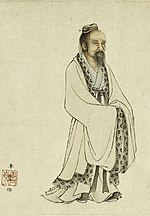Zhou Dunyi (Chinese: 周敦頤; Wade–Giles: Chou Tun-i; 1017–1073) was a Chinese cosmologist, philosopher, and writer during the Song dynasty. He conceptualized...
13 KB (1,466 words) - 18:53, 2 August 2024
The Vase with the Poet Zhou Dunyi is a traditional Chinese porcelain vase produced in 1587, during the Ming Dynasty. The Vase can be identified by its...
15 KB (1,727 words) - 07:17, 24 October 2024
model. Such a diagram was first introduced by Neo-Confucian philosopher Zhou Dunyi of the Song Dynasty in his Taijitu shuo (太極圖說). The Daozang, a Taoist...
28 KB (3,134 words) - 10:22, 23 October 2024
the neo-Confucianists of the Song dynasty. The Song dynasty philosopher Zhou Dunyi (1017–1073) is seen as the first true "pioneer" of neo-Confucianism, using...
30 KB (3,650 words) - 07:43, 28 October 2024
According to Zhu, Zhou Dunyi was the linkage between the classical patriarchs of Confucianism that ended with Mengzi with their time. Zhou himself believed...
55 KB (8,032 words) - 09:35, 1 November 2024
Zhuangzi (book) (section Zhuang Zhou)
States period (476–221 BC) and is named for its traditional author, Zhuang Zhou, who is customarily known as "Zhuangzi" ("Master Zhuang"). The Zhuangzi consists...
53 KB (6,525 words) - 12:55, 9 November 2024
equivalent to the structure of the human body." The Song-era philosopher Zhou Dunyi (1017-1073 CE) wrote the Taijitushuo (太極圖說) "Explanation of the Diagram...
18 KB (2,114 words) - 14:46, 17 July 2024
Zhuang Zhou (/dʒuˈɑːŋ ˈdʒoʊ/), commonly known as Zhuangzi (/ˈdʒwɑːŋˈdzʌ/; Chinese: 莊子; literally "Master Zhuang"; also rendered in the Wade–Giles romanization...
15 KB (1,377 words) - 10:13, 1 September 2024
adopted by gnostics, neopagans and occultists. Supreme Polarity (Taijitu) Zhou Dunyi (1017-1073 AD), Taoism "Explanation of the Diagram of the Supreme Ultimate"...
15 KB (146 words) - 14:24, 24 October 2024
legitimacy to the Zhou's own rebellion. No Western Zhou bronze inscriptions mention the Xia, or any other dynasty preceding the Shang. The Zhou believed that...
38 KB (4,781 words) - 01:49, 5 November 2024
Taoist, and Legalist features. The first philosophers, such as Shao Yong, Zhou Dunyi and Chang Zai, were cosmologists and worked on the I Ching. The Cheng...
41 KB (4,898 words) - 05:31, 19 September 2024
Confucian Dao: Zhu Xi's Appropriation of Zhou Dunyi (2014), a study of how and why Zhu Xi chose Zhou Dunyi to be the first true Confucian Sage since...
31 KB (3,856 words) - 16:28, 15 October 2024
(太極圖說, "Explanation of the Diagram of the Supreme Ultimate"), written by Zhou Dunyi, was the cornerstone of Neo-Confucianist cosmology. His brief text synthesized...
17 KB (2,143 words) - 00:00, 21 October 2024
Chinese theology (redirect from Shang-Zhou theology)
power by divine right; the Zhou transformed this claim into a legitimacy based on moral power, the Mandate of Heaven. In Zhou theology, Tian had no singular...
89 KB (11,363 words) - 12:03, 19 October 2024
concepts Fuji (planchette writing) Fulu Octal Compare this statement from Zhou Dunyi's 太極圖說 Taijitu shuo "Explanation of the Supreme Polarity Diagram" :...
59 KB (2,183 words) - 10:23, 11 November 2024
his use of gongans. Jizang Sengzhao Yi Xing Zhi Dun Xuanzang Huiyuan Zhou Dunyi, argued for the inseparability of metaphysics and ethics. Cheng Yi, made...
6 KB (689 words) - 14:29, 3 May 2024
multiplicity of the world is ultimately grounded in an ineffable, empty source. Zhou Dunyi, a Song dynasty philosopher, synthesized Taoist and Confucian ideas in...
33 KB (4,230 words) - 14:14, 23 October 2024
Historian, and Zhuangzi, as well as from famous Chinese thinkers like Zhu Xi, Zhou Dunyi, and Mencius. Early tai chi sources are grounded in Taiji cosmology. Taiji...
50 KB (5,366 words) - 22:41, 10 November 2024
Confucianism (section Zhou traditions wane)
inherited from the Xia (c. 2070–1600 BCE), Shang (c. 1600–1046 BCE) and Western Zhou (c. 1046–771 BCE) dynasties. Confucianism was suppressed during the Legalist...
129 KB (15,261 words) - 21:35, 30 October 2024
important Idealist Neo-Confucian. Zhang Zai – pioneering Neo-Confucian. Zhou Dunyi – Song Dynasty philosopher. Zhu Xi – one of the leading Neo-Confucians...
3 KB (251 words) - 08:17, 17 April 2024
Laozi (category Zhou dynasty philosophers)
China's Spring and Autumn period. Serving as the royal archivist for the Zhou court at Wangcheng (in modern Luoyang), he met and impressed Confucius on...
42 KB (4,597 words) - 20:20, 24 October 2024
text of the I Ching has its origins in a Western Zhou divination text called the Changes of Zhou (周易 Zhōu yì). Various modern scholars suggest dates ranging...
35 KB (4,143 words) - 21:30, 9 November 2024
Chinese sun and moon mirrors (section Rites of Zhou)
fire-starting mirror are fúsuì (夫遂; with 夫 "that") used in the Rites of Zhou, jīnsuì (金燧; with 金 "metal") used in the Book of Rites (below), and yángfú...
63 KB (9,277 words) - 17:15, 17 August 2024
century CE. Early Taoism drew upon diverse influences, including the Shang and Zhou state religions, Naturalism, Mohism, Confucianism, various Legalist theories...
204 KB (24,060 words) - 22:54, 6 November 2024
with his older brother Cheng Hao. Like his brother, he was a student of Zhou Dunyi, a friend of Shao Yong, and a nephew of Zhang Zai. The five of them along...
7 KB (701 words) - 00:56, 4 August 2023
Shen Kuo Su Song Wang Anshi Wang Chongyang Wang Chuyi Ye Shi Zhang Zai Zhou Dunyi Zhu Xi Yuan Ming Chen Jiru Huang Zongxi Hong Zicheng Jiao Hong Jiao Yu...
31 KB (3,499 words) - 03:59, 12 September 2024
Taoists and Confucians. Several sections of the works attributed to Zhuang Zhou are dedicated to critiques of the failures of Confucianism. The translator...
49 KB (6,217 words) - 03:34, 4 October 2024
philosopher Confucius. It was developed in the Spring and Autumn period during the Zhou dynasty. The main concepts of this philosophy include ren (humaneness), yi...
12 KB (1,310 words) - 07:57, 10 November 2024
appeared inside a lotus flower. In Chinese culture, Confucian scholar Zhou Dunyi 1017–1073) wrote (borrowing from Gautama Buddha's famous metaphor): I...
14 KB (1,418 words) - 08:25, 7 November 2024
(Chinese: 性; pinyin: xìng), or human nature. A Daoist view described by Zhuang Zhou, describes xin (心) as being socialised, with environmental pressures influencing...
5 KB (617 words) - 18:06, 10 November 2024




















